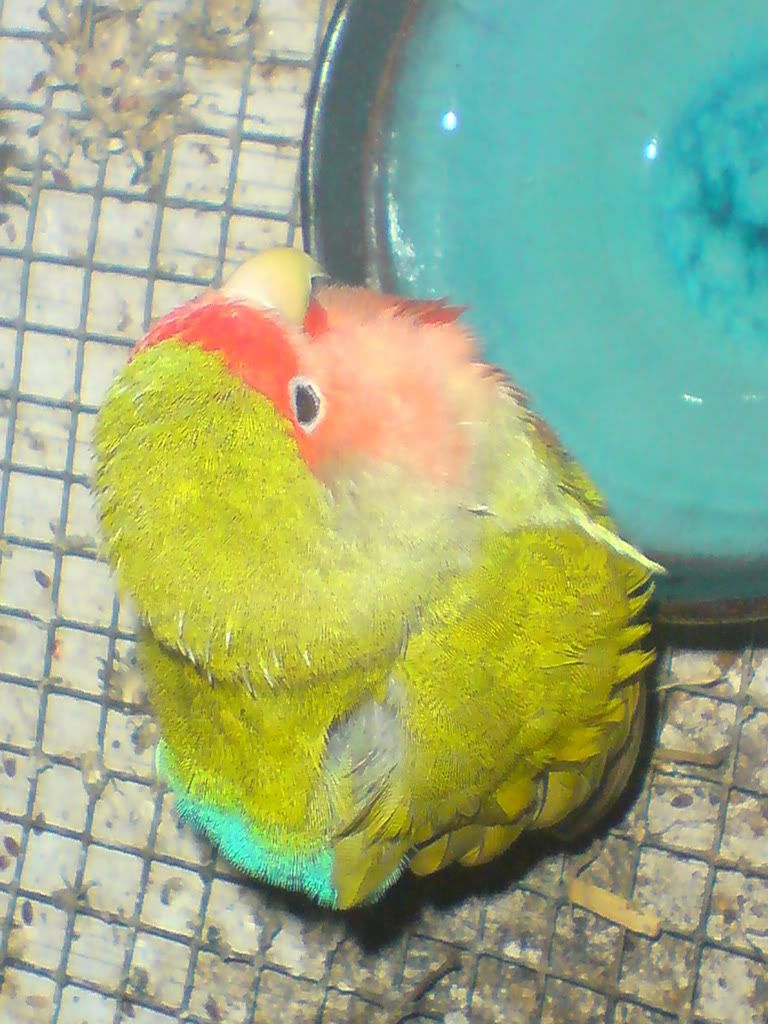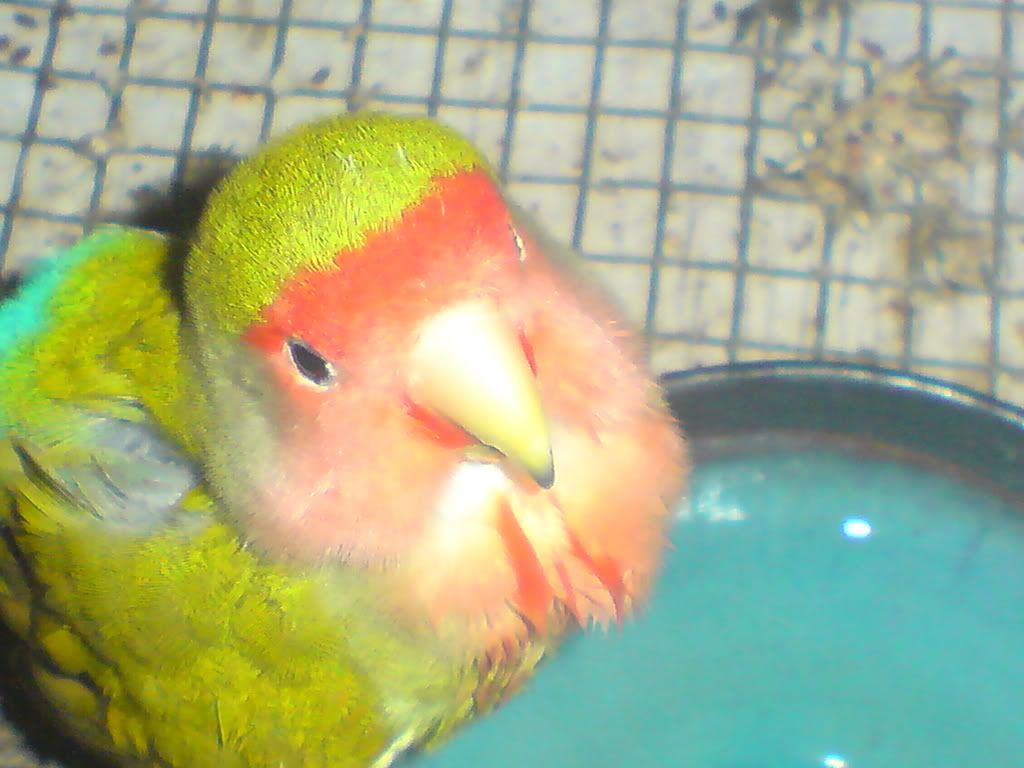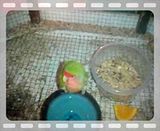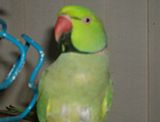hoping you can help
Moderator: Mods
hoping you can help
went down to my neighbour yesty he has moved and left a few things for me to grab anyways he left behind his bird im pretty sure its a peach face well its been raining non stop here for a week and the little thing was left out in the rain so we brang it home just wondering if its sick it sleeps almost all the time doesnt sit on one leg it isnt scared it is eating and drinking but it isnt very active or making much noise i am hoping he will let me keep the birdy its cage was so gross its food and water dishes had mould in them so cleaned it all am bout to worm it and spray it for lice please any advice would be appreciated im guna go research the bird in case he lets me keep it
-
catschair2
- Posts: 320
- Joined: Thu May 03, 2007 8:38 pm
- Location: San Diego, CA
getting him into vet tomorrow is there anything i can do till then? how does the infection spread? will keeping it in the same room but on the oppisite side give it to cookie and chippy choo (aunts bird staying over for a cuople weeks) if it is an infection should i get a new cage cause tried to clean it still isnt fantastic it was pretty gross was guna get it a new one anyway its in a small avery type cage. what tests should i ask the vet to do? thanks guys
OMG lol you were watching that brit auction show where one couple completely flunked out and the other couple "apparently" didnt do too bad! Its so sad that I know that so well.. but I have never seen that show before so it was pretty fresh in my memory lol
Well... lets get to this bird.
I would have to say, that it looks to be in good shape from the situation you said you got it from. I would be giving it worming fluid in its water, then after that be dosing the little guy up on vitamin supplements etc
That little spasm i have seen before in other birds (not identical) and I would honestly say its from one completely dead bored bird, that has had nothing to interact with most if not all of its poor life. Once you have cleared it and its in good health, get that poor little thing a friend. OR if you dont want another one of them, (its just a pure rescue) get that little tiger some toys, preening ones etc, like cloth ones.
You may find a mirror would freak a bird out in its situation, so might not want to try that.
Just going from previous rescue experiences, but I would say that spasm is self entertainment / mentally derived due to its living standards. It also resembles regurgitation... but I could be wrong... not like something bad, just a form of self excitement.
Hope he/she goes well. Looks sweet as!
Well... lets get to this bird.
I would have to say, that it looks to be in good shape from the situation you said you got it from. I would be giving it worming fluid in its water, then after that be dosing the little guy up on vitamin supplements etc
That little spasm i have seen before in other birds (not identical) and I would honestly say its from one completely dead bored bird, that has had nothing to interact with most if not all of its poor life. Once you have cleared it and its in good health, get that poor little thing a friend. OR if you dont want another one of them, (its just a pure rescue) get that little tiger some toys, preening ones etc, like cloth ones.
You may find a mirror would freak a bird out in its situation, so might not want to try that.
Just going from previous rescue experiences, but I would say that spasm is self entertainment / mentally derived due to its living standards. It also resembles regurgitation... but I could be wrong... not like something bad, just a form of self excitement.
Hope he/she goes well. Looks sweet as!
Oh that poor baby  Glad you cane to it's rescue but like Julie said keep it away from your exiting flock. You said the food and water had mold in it then I would have it tested for Aspergillosis and Giardia. Get rid of the cage too ASAP.
Glad you cane to it's rescue but like Julie said keep it away from your exiting flock. You said the food and water had mold in it then I would have it tested for Aspergillosis and Giardia. Get rid of the cage too ASAP.
Aspergillosis in birds is an infection by a mold found in the air, in the soil, in animal feeds, and especially in animal bedding. In nature, this fungus derives its nutrition from decaying plant and animal material. Aspergillus is considered infectious, capable of growing inside a living animal. It is generally not considered contagious, however, since most birds pick it up from their environment. The mold is known as an opportunistic invader, causing disease only under special circumstances.
Infection generally occurs when the bird inhales airborne mold spores. If this inhaled dose is high enough to overwhelm the immune system, the bird becomes ill. A bird with a weakened immune system does not require a very high dose of spores. Stressors such as a new cage, moving to a new home, boarding, a new pet in the home can suppress the immune system. Prolonged illness, traumatic injuries, smoke inhalation (cigarettes), and treatment with immunosuppressive drugs will also lead to immunocompromise. Nutrition is paramount in preventing illnesses such as aspergillosis. An inadequate dietary level of vitamin A will cause a change in the mucus membranes and respiratory tract lining, weakening the front line of defense against infection. Deficient levels of zinc, vitamin C, vitamin E; B vitamins in the body can lead to an inadequate immune response and reduce resistance to disease. Finally, when antibiotics are not used properly, or if they are given for an extended period of time, the defenses against aspergillosis wane.
Two forms of aspergillosis are recognized, namely the acute from and the chronic form. The acute from is uncommon, and is usually found in wild birds or pets kept under unsanitary conditions. If occurs following exposed to an overwhelming number of mold spores, such as when ground corncobs get wet and moldy. The lungs and airsacs are rapidly colonized by a massive amount of mold. With this form a bird might lose it’s appetite, drink excessively, urinate excessively, have difficulty breathing, or exhibit a bluish discoloration to the skin. It could die without any sign of illness. The chronic form, on the other hand, is more common. These birds have a weakened immune system, and the infection can even enter the bloodstream where it travels to other organs. Birds that are chronically infected with Aspergillus show a variety of respiratory signs, including a runny nose, swollen face, inability to exercise, respiratory click, or a reluctance to talk or vocalize. They may have a lack of appetite and lose weight. Birds might have diarrhea or increased urination. Often birds with chronic aspergillosis are depressed and lethargic. Often discoloration of the urates can occur, and some birds behave strangely or even have seizures.
When veterinarian suspects that your bird might have aspergillosis, a variety of diagnostic tests may be employed to establish a diagnosis. The white blood cell count is frequently elevated, and enzymes may be released from tissues damaged by the infection. Some birds become anemic. Radiographs (X-rays) can show the location of abscesses, changes in the respiratory tract, or other signs of disease. An examination through the lenses of a rigid endoscope will allow direct visualization of the airsacs and abdominal organs, and will provide the opportunity to collect biopsy samples for culture and microscopic analysis. In recent years, accurate tests have been developed to detect the presence of Aspergillus in the bloodstream, and the immune response to it. Inflammatory proteins can also be evaluated in the blood, giving further evidence that the bird is fighting infection.
Once the diagnosis is confirmed, treatment is initiated to begin control of the fungus. In the initial stages, nursing care may be the most important part of treatment. Sick birds require warmth, humidity, proper nutrition, and plenty of fluids. Medications target the fungal infection, but often antibiotics are also used to fight or prevent concomitant bacterial infections that are common in these patients. Nebulization is sometimes used to humidify the airways and deliver topical doses of medicine deep into the respiratory system. Treatment can include surgery to debrief and cleanse the areas where pus, fungus, and debris have collected. In most cases, medications must be given for several months since it is the birds immune system that is responsible for cleanup while the medications simply hold the infection in check.
In order to protect a bird from infection by Aspergillus, it is important to keep stressors to a minimum. Birds do well when they are brought up learning that changes are a normal part of life, and when the home environment provides clear, consistent, loving guidelines. Of course, proper nutrition is key to the health of all animals. A varied diet based on a high quality pelleted ration is recommended. Birds eating this way get sick less frequently than those one seed based diets. Since the Aspergillus fungus grows readily in moist, dirty environments, one must provide good ventilation and keep the cage and surrounding area very clean. For veterinarians, one way to prevent infection is to routinely prescribe antifungal agents when avian patients are on extended courses of antibiotics or are otherwise immunocompromised.
Donna Please keep us posted
Aspergillosis in birds is an infection by a mold found in the air, in the soil, in animal feeds, and especially in animal bedding. In nature, this fungus derives its nutrition from decaying plant and animal material. Aspergillus is considered infectious, capable of growing inside a living animal. It is generally not considered contagious, however, since most birds pick it up from their environment. The mold is known as an opportunistic invader, causing disease only under special circumstances.
Infection generally occurs when the bird inhales airborne mold spores. If this inhaled dose is high enough to overwhelm the immune system, the bird becomes ill. A bird with a weakened immune system does not require a very high dose of spores. Stressors such as a new cage, moving to a new home, boarding, a new pet in the home can suppress the immune system. Prolonged illness, traumatic injuries, smoke inhalation (cigarettes), and treatment with immunosuppressive drugs will also lead to immunocompromise. Nutrition is paramount in preventing illnesses such as aspergillosis. An inadequate dietary level of vitamin A will cause a change in the mucus membranes and respiratory tract lining, weakening the front line of defense against infection. Deficient levels of zinc, vitamin C, vitamin E; B vitamins in the body can lead to an inadequate immune response and reduce resistance to disease. Finally, when antibiotics are not used properly, or if they are given for an extended period of time, the defenses against aspergillosis wane.
Two forms of aspergillosis are recognized, namely the acute from and the chronic form. The acute from is uncommon, and is usually found in wild birds or pets kept under unsanitary conditions. If occurs following exposed to an overwhelming number of mold spores, such as when ground corncobs get wet and moldy. The lungs and airsacs are rapidly colonized by a massive amount of mold. With this form a bird might lose it’s appetite, drink excessively, urinate excessively, have difficulty breathing, or exhibit a bluish discoloration to the skin. It could die without any sign of illness. The chronic form, on the other hand, is more common. These birds have a weakened immune system, and the infection can even enter the bloodstream where it travels to other organs. Birds that are chronically infected with Aspergillus show a variety of respiratory signs, including a runny nose, swollen face, inability to exercise, respiratory click, or a reluctance to talk or vocalize. They may have a lack of appetite and lose weight. Birds might have diarrhea or increased urination. Often birds with chronic aspergillosis are depressed and lethargic. Often discoloration of the urates can occur, and some birds behave strangely or even have seizures.
When veterinarian suspects that your bird might have aspergillosis, a variety of diagnostic tests may be employed to establish a diagnosis. The white blood cell count is frequently elevated, and enzymes may be released from tissues damaged by the infection. Some birds become anemic. Radiographs (X-rays) can show the location of abscesses, changes in the respiratory tract, or other signs of disease. An examination through the lenses of a rigid endoscope will allow direct visualization of the airsacs and abdominal organs, and will provide the opportunity to collect biopsy samples for culture and microscopic analysis. In recent years, accurate tests have been developed to detect the presence of Aspergillus in the bloodstream, and the immune response to it. Inflammatory proteins can also be evaluated in the blood, giving further evidence that the bird is fighting infection.
Once the diagnosis is confirmed, treatment is initiated to begin control of the fungus. In the initial stages, nursing care may be the most important part of treatment. Sick birds require warmth, humidity, proper nutrition, and plenty of fluids. Medications target the fungal infection, but often antibiotics are also used to fight or prevent concomitant bacterial infections that are common in these patients. Nebulization is sometimes used to humidify the airways and deliver topical doses of medicine deep into the respiratory system. Treatment can include surgery to debrief and cleanse the areas where pus, fungus, and debris have collected. In most cases, medications must be given for several months since it is the birds immune system that is responsible for cleanup while the medications simply hold the infection in check.
In order to protect a bird from infection by Aspergillus, it is important to keep stressors to a minimum. Birds do well when they are brought up learning that changes are a normal part of life, and when the home environment provides clear, consistent, loving guidelines. Of course, proper nutrition is key to the health of all animals. A varied diet based on a high quality pelleted ration is recommended. Birds eating this way get sick less frequently than those one seed based diets. Since the Aspergillus fungus grows readily in moist, dirty environments, one must provide good ventilation and keep the cage and surrounding area very clean. For veterinarians, one way to prevent infection is to routinely prescribe antifungal agents when avian patients are on extended courses of antibiotics or are otherwise immunocompromised.
Donna Please keep us posted
i think first of all,
he need a fluid therapy with electrolytes,vitamins ang high energy for few days, i would gave him something like that http://www.birdcareco.com/English/Produ ... html#guard
keep him in warm place 25-30C with enough humidity and of coarse keep him in quarantine from your other bird
he need a fluid therapy with electrolytes,vitamins ang high energy for few days, i would gave him something like that http://www.birdcareco.com/English/Produ ... html#guard
keep him in warm place 25-30C with enough humidity and of coarse keep him in quarantine from your other bird
"Jibby aka Gilbert" Indian Ringneck 13 years "Charlie" Rex Rabbit 1 year
alana8819 wrote:getting him into vet tomorrow is there anything i can do till then? how does the infection spread? will keeping it in the same room but on the oppisite side give it to cookie and chippy choo (aunts bird staying over for a cuople weeks) if it is an infection should i get a new cage cause tried to clean it still isnt fantastic it was pretty gross was guna get it a new one anyway its in a small avery type cage. what tests should i ask the vet to do? thanks guys
I wouldn't recommend keeping any new bird in the same room until they have been properly quarantined.
well the bird has improved alot since he has been inside and warm took him to the vet he is ok under weight and has mites so we've treated him for mites and giving him plenty of food. vet said he is quiet healthy considering so i am happy. bought new cage and toys although the cage top broke piece of crap and we're cut off from town from all the rain so cant get him a new one for a few days. i tell you what he is feisty  first two days just slept and looked unwell since he has gotten a good feed and had a warm place to sleep he has perked up running round gave him some orange when i tried to get it back out of his cage bit my jumper and was swinging off it
first two days just slept and looked unwell since he has gotten a good feed and had a warm place to sleep he has perked up running round gave him some orange when i tried to get it back out of his cage bit my jumper and was swinging off it 
 he regurgitates a bit and re-eats it vet said its probably a boredom thing but i gotta take him in for another check up in two weeks to make sure he is still doing okay vet said poop looked good eyes nice and clear good beak and feet etc have to keep him separated from cookie for another two weeks just to be safe thanks for all your help
he regurgitates a bit and re-eats it vet said its probably a boredom thing but i gotta take him in for another check up in two weeks to make sure he is still doing okay vet said poop looked good eyes nice and clear good beak and feet etc have to keep him separated from cookie for another two weeks just to be safe thanks for all your help  we're thinking of calling him sid. any way to tell how old he is or if it is a girl or boy?
we're thinking of calling him sid. any way to tell how old he is or if it is a girl or boy?




